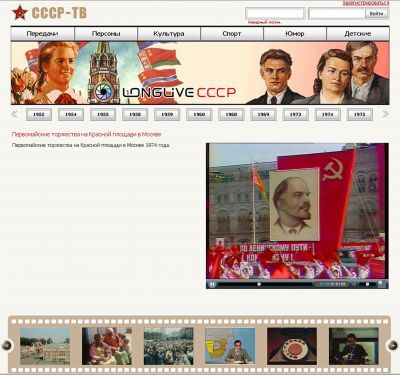USSR meets YouTube in Russian web nostalgia project

Your support helps us to tell the story
From reproductive rights to climate change to Big Tech, The Independent is on the ground when the story is developing. Whether it's investigating the financials of Elon Musk's pro-Trump PAC or producing our latest documentary, 'The A Word', which shines a light on the American women fighting for reproductive rights, we know how important it is to parse out the facts from the messaging.
At such a critical moment in US history, we need reporters on the ground. Your donation allows us to keep sending journalists to speak to both sides of the story.
The Independent is trusted by Americans across the entire political spectrum. And unlike many other quality news outlets, we choose not to lock Americans out of our reporting and analysis with paywalls. We believe quality journalism should be available to everyone, paid for by those who can afford it.
Your support makes all the difference.Huge red banners hang over Moscow's Red Square and hundreds of Communist dignitaries are awaiting the annual May Day parade as the announcer's booming voice, filled with pride, breaks the silence.
"Red Square is especially beautiful on this holiday morning!" he says. "On such days every Soviet citizen, whether in Moscow or far from the capital, in any corner of our country, has Red Square in his heart and mind."
This isn't now. This was 1974, but the clip from Soviet television can be found on a new Russian website that seeks to bring Communist nostalgia into the Internet age with content ranging from anti-Western propaganda to comedy shows and Soviet sports victories.
The creators of CCCP-TV.ru, whose address resembles the Russian letters for "USSR," believe that millions of Russians will eventually use the site to get their fix of childhood memories.
Longing for Communist times is common in Russia, two decades after the fall of the Berlin Wall.
Fully 58 percent of Russians agree that "it is a great misfortune that the Soviet Union no longer exists," according to a poll published this month by the US-based Pew Research Centre.
Against that background, cable television channels offering old Soviet broadcasts and cafes decorated with kitschy Communist memorabilia do brisk business.
The new website was launched on November 7, the anniversary of the Bolshevik Revolution which is no longer an official holiday in Russia though still typically marked with protests staged by elderly Communists.
November 7 was the "right date" to launch the website, said Andrei Akopian, the head of Uravo, the company behind the site.
Akopian denied his project had any political agenda.
"Our main goal is to bring this content to everyone who wants to see it," said Akopian, whose company launched the site in partnership with Russia's State Television and Radio Fund, which provided the recordings.
"You can't get away from the political context, of course. Everyone will see this in their own way," Akopian said.
The purpose of the website is strictly capitalist: Akopian eventually plans to sell advertisements on the website and to link it to online auctions for Communist-themed collectibles.
He also hopes to expand its content from the several dozen clips available currently to thousands more, drawing on the vast archive of the State Television and Radio Fund.
"There is a potential audience of several million people in Russia... plus several more million in ex-Soviet countries and abroad, in America, Canada, Britain and so on," Akopian said.
The CCCP-TV.ru website is following in the footsteps of the Nostalgia and Retro cable television channels, both of which have found an audience by re-broadcasting old Soviet television recordings.
Such channels owe their popularity to nostalgia for peoples' younger days, rather than a desire to restore the Soviet empire, said Arina Borodina, a television critic for the Kommersant daily newspaper.
"I don't see anything bad about this. It puts one in a good mood," Borodina told AFP.
However she questioned whether CCCP-TV.ru would find a large audience, noting that the majority of Nostalgia and Retro viewers were middle-aged and not likely to subscribe to high-speed Internet services.
"This isn't exactly the Internet generation," Borodina said.
Some clips on the website provide a glimpse into the Soviet state propaganda machine and its attempts to portray the capitalist West as an immoral and decadent empire in decline.
One video, a 1974 documentary on gambling in Britain, shows men chomping on cigars and wearing bowler hats as the filmmakers expose the evils of casinos, which were illegal in the Soviet Union.
"Gamblers bet twice as much money as England spends on education, four times what it spends on scientific research, 10 times what it spends on building new roads," it says as dogs are shown running around a racetrack.
But other videos, which range in date from the 1950s to the 1980s, are non-political broadcasts of ballets, children's shows and comedy shows featuring widely loved stars.
The most popular clips, according to tests conducted before the launch, were the comedy shows, a 1960 Soviet-Canadian hockey match, and footage of a 1975 meeting of Soviet leader Leonid Brezhnev with cosmonauts, Akopian said.
Join our commenting forum
Join thought-provoking conversations, follow other Independent readers and see their replies
Comments